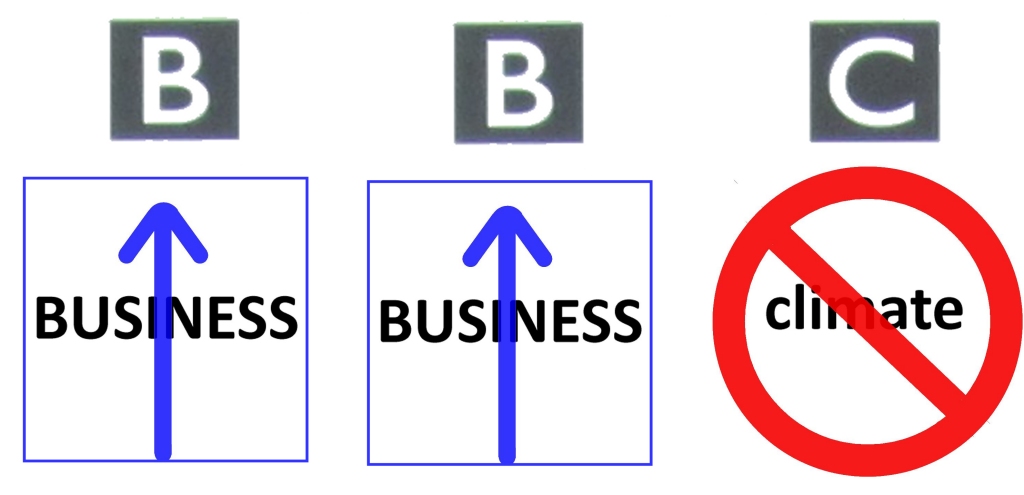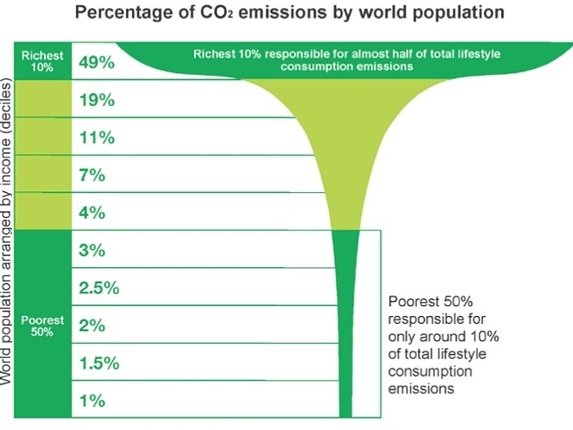posted by
Geoff on 10th Aug 2015
10th,Aug
Could giving everyone an equal carbon dividend
support a low waged economy
with a happier less polluting work force?
Carbon Fee and Dividend
In a previous post “Stop growth, redistribute wealth and try to save the planet” the idea of green redistribution is described:
One possible scheme to avoid dangerous climate change is this: Levy a high tax on carbon emissions and share the proceeds equally. To avoid dangerous climate change, the tax will need to be high enough to substantially reduce carbon emissionsn. Howevver, this will cause a fall in production and consumption.
Compared to the poor, the rich and affluent cause more carbon emissions simply because they consume more. Their share of the proceeds would not cover their increased taxes. For the poor, who have lower emissions there would be a net gain. Ther is therefore a redistribution from the rich and affluent to the poor. The post World Wide Carbon Fee and Dividend describes such a scheme.
It is not Green Growth but it is Green Redistribution.
To avoid dangerous climate change, the tax will need to be high enough to substantially reduce carbon emissions. This will cause a fall in production and consequent consumption. Applied to nations this becomes James Hansen’s Carbon Fee & Dividend. The key point here is that everybody has a basic income from their carbon dividend.
The minimum wage
All political parties in the UK support a minimum or living wage, although the Liberal Democrats have expressed some caution about its effects on employment:
Liberal Democrats will ask the Low Pay Commission to look at ways of raising the National Minimum Wage as the economy grows without damaging employment opportunities.
continue reading…
posted by
Geoff on 7th Aug 2015
7th,Aug
A proposal from the past (1973)
0.0 – PREFACE
For some time now I have thought that housing and associated service systems were, as a whole, much neglected and have been frustrated at the thought that there was little chance of many good ideas for improving housing ever getting put into practice.
There seemed to be many ideas that were talked about but nothing much beyond that. Meeting others that felt the same and had the will to do something about it (mainly Norman Fellows and Heimir Salt) and given the opportunity to do some research into housing this year I was prompted to start writing what follows which is meant to explain our objectives.
One of the first things we did was to approach Bob Jefferies of the Dept of Town Planning and discuss it with him. He has given much valuable critical comment and has made us see the significance of what we want to do and put it in its context.
With limited resources it is unlikely that we ourselves shall achieve much but at least we can hope to influence thinking on the subject so that others may be able to.
1.0 – INTRODUCTION
Although there is a general awareness that there are radical changes occurring in our society, (and it is not clear whether these are really social economic, political or ecological) and although there are many professionals and academics saying that to cope with these changes interdisciplinary barriers must be broken down, these barriers seem as high as ever.
continue reading…
posted by
Geoff on 7th Aug 2015
7th,Aug
This post was the contents of RenewalCities.org
(now retired)
RENEWAL CITIES
Renewal Cities are developments that use the wealth they create to sponsor grand and worthwhile projects.
Our first scheme – a city in North Kent.
The Hoo Peninsular Renewal City will be a modern carbon negative city where people from varying walks of life will want to live. Its predicted population is 250,000. This is much larger than any of the proposed ecotowns. As well developing carbon negative lifestyles, some of the wealth created by this development will finance carbon capture and storage at the neighbouring Kingsnorth power station. The city will be funded using the value inherent in planning permission.
The value of planning permission
Development creates value. In Britain, a large proportion of this value can be recognised as the value of planning permission. The values of land is greatly increased when planning permission changes agricultural land into building land. The difference is the value of the planning permission. A typical figure for the planning permission value of a house is £100,000.
3 million new homes – £300 billion to spend
The UK government is planning 3 million new homes. A reasonable estimate of the planning permission value of these homes is £300 billion. With the correct mechanisms in place this can be captured for good causes. One advantage of using planning permission value is that the source of the value is opaque – it needs a good understanding of the economics to see how the value is created.
continue reading…
posted by
Geoff on 5th Aug 2015
5th,Aug
The transition to low carbon, “modern” lifestyles
may break existing carbon budgets.
Carbon Brief reports: the remaining carbon budget to give a 66% chance of keeping global warming below 1.5°C is 243 billion tonnes. That means, if humanity emits another 243 billion tonnes of CO2e, global temperatures will rise to 1.5°C above pre-industrial levels. Using the same calculations, the remaining carbon budget, to keep below 2°C is 843 billion tonnes.
An earlier piece, “Is Green Growth a Fantasy?“, explained how this was converted to personal carbon budgets:
“World population was estimated recently at 7,317,801,293 by Worldometers. Dividing the remaining carbon budgets by the world’s population gives 33 tonnes of CO2e for a 1.5°C rise. For a 2°C rise this calculates as 115 tonnes per person.”
Is Green Growth a Fantasy? also made the assumption that this budget should last until it is possible to extract carbon dioxide from the atmosphere on a mass scale. It assumed this could start in 2050. Relying on carbon extraction maybe risky, but, according to the IPCC (and now others), there is little choice.
The report, Zero Carbon Britain, (ZCB) from the Centre for Alternative Technology (CAT) examines carbon reduction targets to avoid dangerous climate change
“Zero Carbon Britain (ZCB) scenario demonstrates that we could rapidly reduce UK greenhouse gas (GHG) emissions to net zero by 2030, using only currently available technology.”
“We can do this whilst maintaining a modern standard of living.”
ZCB envisages some changes to lifestyles: Less travelling, a changed diet but at the same time maintaining “a modern standard of living”.
The embodied carbon in low carbon infrastructure
continue reading…
posted by
Geoff on 22nd Jul 2015
22nd,Jul
Stop growth, redistribute wealth and try to save the planet
Consume less or consume more?
A previous piece, A green recession and full employment, starts
To save the world from climate catastrophe we need a recession because we have to cut consumption that pollutes. We need a “green recession“.
In the section, On the need to decrease economic growth in the Encyclical Laudato Si, Pope Francis says
given the insatiable and irresponsible growth produced over many decades, we need also to think of containing growth by setting some reasonable limits and even re- tracing our steps before it is too late.
“re- tracing our steps before it is too late” means reverting to previous less polluting lifestyles and reducing consumption. Less consumption would mean a recession.
However, the World Bank advocates more consumption. In End extreme poverty and promote shared prosperity, it says
[To end extreme poverty] will require sustaining high rates of economic growth across the developing world, as well as translating growth more effectively into poverty reduction in each developing country.
Ending poverty
continue reading…
posted by
Geoff on 20th Jul 2015
20th,Jul

The BBC is reckless in continually promoting economic growth without warning about its climate dangers. (See a previous post Is Green Growth a Fantasy? or Kevin Anderson’s impressive interview in Climate targets ‘impossible’ unless rich cut emissions 10%}
What follows is the tail end of the BBC’s response to my complaint that there are no warnings. The complaint was not considered because I did not give a specific example. However, every business programme they broadcast is an example.
The BBC still says
Our core mission remains the same as it was when we were established back in 1922:
to inform, educate and entertain.
But the BBC does not inform us on the dangers of economic growth to the climate. That is clearly a breach of the BBC’s mission and so is “a breach of the BBC’s standards”.
Request for review by Trustees
The complainant [Geoff Beacon] asked that [BBC] Trustees review the decision of the Senior Complaints Adviser that the appeal should not proceed.
[Geoff Beacon] said:
1) All BBC business output promotes growth.
2) No BBC business output notes its climate dangers.
He also enquired if he should complain about a few business programmes at random.
He objected to the BBC Audience Services’ stance whereby they wrote to him:
We can only investigate complaints when we are given a specific example of when a said incident occurred on output produced by the BBC. If you would like to give us a specific example of a story on economic growth that we covered (transmission date, programme etc), where you feel it would have been relevant to the story to mention environmental issues, we can investigate and respond in detail.
He stated that his complaint is that:
The BBC never mentions the economic causes of the environmental disaster that is clearly on the horizon. Even if this disaster is not clear to the BBC, it is clear to many scientific observers, who deserve a mention. Does the requirement to give a specific example of something that never happens, mean that it is impossible to make a complaint to the BBC on this issue?
The Panel’s decision
continue reading…
posted by
Geoff on 14th Jul 2015
14th,Jul
Carbon emissions must be reduced to avoid dangerous climate change. Economic growth will increase emissions unless production is decarbonised.
Can the world’s economy be decarbonised fast enough to allow growth that is also green?
Or must the world’s economy shrink?
1
The carbon intensity of production
The total production of the world economy is the combined production of all the countries in the world. It is called the gross world product (GWP). In dollar terms, this has been estimated as $87 trillion for 2013.
The amount of greenhouse gasses humans emit is determined partly by GWP. It is also also determined by how much greenhouse gas is emitted for each unit of GWP. Roughly 400 grammes of CO2 are emitted for each dollar’s worth of production. This the Carbon Intensity. It gives
Global_emissions_of_CO2 = Gross_World_Product*Carbon_Intensity
Global_emissions_of_CO2 in numbers is:
$87 trillion * 400 grammes CO2/$ = 35 billion tonnes
The goods and services the “average” person produces is the Personal_Product so
Gross_World_Product= World_Population*Personal_Product
Gross_World_Product in numbers is:
6.8 billion people * $1300= $87 trillion
This means Global_emissions_of_CO2 is (1)
World_Population*Personal_Product*Carbon_Intensity
This helps us see that there are three ways of reducing carbon emissions:
- Reduce World Population
- Reduce Personal Product
- Reduce Carbon Intensity
continue reading…
posted by
Geoff on 5th Jul 2015
5th,Jul
Embodied carbon means…
We must rethink Sir Peter Hall’s eco-town vision
The carbon dioxide emissions due to construction are called “embodied carbon”. It has only recently has it been acknowledged that building homes, offices, factories, shops and roads is very carbon intensive.
In November 2008, I attended a talk by Sir Peter Hall. The slides he showed are on ECO-TOWNS: Will they be Eco-? Can they become Towns? After a short introduction about climate change and the need for more housing, he described eco-towns in England and a few in Europe. He gave a positive impression of all of them and how they were reducing carbon emissions.

Sir Peter Hall – A mistaken vision for eco-towns
Most of the English examples were proposed eco-towns that had not been built at the time – and they probably never will be. However, the first one he showed had been built. It was the Beddington Zero Energy Development (BedZED) for which he noted:
BEDZED: UK’s largest eco-village• Opened March 2002
• BioRegional/ Peabody Trust/Bill Dunster Associates
• 100 homes, community facilities and workspace for 100 people
• Heating requirements: ca 10% typical home
• 60% recycling aim
• Target fossil fuel car miles: 50% national average
• Hackbridge Station 5 mins
• Car Club
• Local facilities: football pitch, club house….
Carbon emissions from construction
continue reading…
posted by
Geoff on 29th Jun 2015
29th,Jun
In 2008, the council threatened businesses who did not remove A-boards with a £2,500 fine over fears they would block pavements and cause accidents, but relented the following year, telling traders no action was likely if boards were propped against buildings.
York Press 6th March 2013
Here’s an A-board that I have moved onto the pavement.

Why did I do this?
Because I have seen several people fall over at this spot. I went to invesigate and found this

That’s why the people tramadol were falling over. One tripped as I was investigating.
It’s the heavy lorries that do it. We need more A-boards to keep them off the pavement.
Four legal questions:
1) What’s my legal position in moving an A-board for public safety.
2) What would York Council’s legal position be if they insist on it being moved and put the public at risk.
3) Who would prosecute?
4) Any action against the lorries?
P.S. The A-board is being read more often.
posted by
Geoff on 11th Jun 2015
11th,Jun

Oxfam graphic: The rich cause most of the CO2 emissions
Worldwide personal carbon budget: 33 tonnes CO2e
(or if we risk 2˚C it’s 115 tonnes)
Carbon Brief reports the remaining carbon budget to give a 66% chance of keeping global warming below 1.5˚C as 243 billion tonnes. That means, if humanity emits 243 billion tonnes more of CO2e global temperature will rise to 1.5˚C above pre-industrial. Using the same calculations, the remaining carbon budget to keep below 2˚C is 843 billion tonnes.
However, we know the climate models that the IPCC used to calculate these remaining budgets (the CMIP5 models) have missing feedbacks and their estimates of temperature rise were underestimates. This means the carbon budgets for given temperature rises are too generous and should be taken as upper limits.
World population was estimated recently at 7,317,801,293 by Worldometers. Dividing Carbon Brief’s remaining carbon budgets by the world’s population sets the remaining worldwide personal carbon budget at a maximum of 33 tonnes CO2e for a 1.5˚C rise or 115 tonnes for a 2˚C rise.
The UK Government aims at a peak temperature 2°C?
But is 2°C safe? Not according to James Hansen. A few days ago, on Australia’s RN breakfast, he said:
continue reading…







